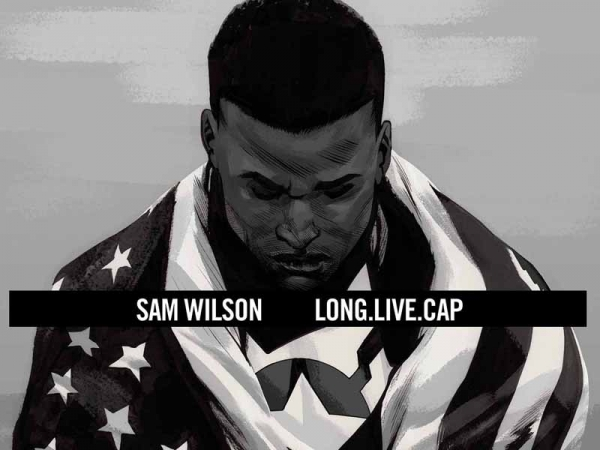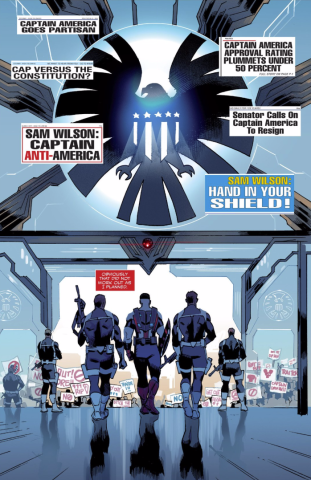In the first issue of Sam Wilson: Captain America, the titular character breaks away from almost seven decades of tradition, setting his star-spangled shield firmly on one side of an increasingly controversial political topic: the immigration debate. The comic opens with our hero squashed uncomfortably between two college seniors in the economy class of a commercial airline. This is a far cry from the Quinjet, Helicarrier, or other expensive quasi-futuristic aerial vehicle we might expect. Sam quickly goes on to explain his current situation.
When Steve Rogers was Captain America, Sam begins explaining, he inspired Americans to work together for the country, but also to come together in genuine good faith. He stayed away from politics, preferring generalized patriotism to specific stances. But, as the new Cap notes:
This country is as divided as it’s ever been. Red and blue, black and white, Republican and Democrat, north and south—feels like we’re constantly at each other’s throats. We don’t trust each other. We no longer see ourselves in our neighbor. And this is not some intellectual debate—people are dying. Our streets are burning. Inequality is soaring. It feels like things are about to break wide open.
In this new, polarized America, Sam Wilson argues, where shadowy government agencies “are getting caught doing things we never dreamt the bad guys would do, even in our worst nightmares,” where unarmed people of color are gunned down by police, where armed vigilantes are kidnapping immigrants, Captain America must take a stance. The more injustice Sam saw, the more he wondered, “Shouldn’t Captain America be more than a symbol?”
Yes. Yes, he decides, if he “really believed [he] could change some minds, do some good—then wasn’t [he] obligated to try?”
It is in pursuit of this goal that Sam finds himself in Arizona, on the border with Mexico, as the fictional hate group Sons of the Serpent intercept a band of immigrants—mostly women and children—entering the country. The leader of the Sons, calling himself the Supreme Serpent, plans to kidnap the immigrants. His plans following the kidnapping are, as of yet, unclear.
Most important, however, is the precise language of his rhetoric. In response to a desperate plea that these immigrants don’t want any trouble, he says, “I can see you have enough trouble with you already. Trouble and disease and crime weigh heavy on your backs.” This is clearly reminiscent of Donald Trump’s language around immigration—most notably during his campaign announcement, when he infamously said that Mexico is “sending people that have lots of problems, and they’re bringing those problems with us. They’re bringing drugs. They’re bringing crime. They’re rapists.”
The Supreme Serpent later notes that this immigration problem will be solved when “the mighty wall is built.” In that same speech, Trump promised to “build a great, great wall on our southern border.”
Though, certainly, the Supreme Serpent is an exaggeration—at one point he laments having to press “one” for English with a shout of “That is something I cannot abide!”—his presentation is still being heavily criticized by right-wing media outlets.
It began on the internet, with articles panning the comic book popping up on conservative sites like The Daily Caller, the Washington Times, and Breitbart.com. Then, astoundingly, it appeared on Fox & Friends, where the hosts alleged that Captain America’s new enemy was conservatives, or simply those with “misgivings about unlimited immigration and the costs associated with it.” Clearly, Fox didn’t do their research—the Sons of the Serpent are the Marvel equivalent of the KKK, not the Republican Party.
Host Tucker Carlson then compared this to the famous original Captain America comic book, which depicted him punching Hitler in the face. “I liked that!” he says, but, “Now the threat comes from ordinary Americans—probably some of you watching at home. They think you’re dangerous.” Ironically, the right-wing furor over this echoes the media’s reaction to Sam Wilson’s comments and actions in the Marvel universe. As Cap leaves the SHIELD helicarrier, presumably for the last time, he’s greeted by a crowd of angry protesters. Above him, news headlines read “Sam Wilson: Hand in Your Shield!” and “Cap Versus the Constitution?” One the of protester’s signs labels him Captain Communist, while numerous name him a traitor.
In fact, the Washington Examiner asked in its headline, “Has Captain America become Captain Anti-America?” while one of the fictional headlines reads “Sam Wilson: Captain Anti-America.” But perhaps the most egregious statement came at the end of the Fox & Friends segment, when Heather Childers concluded with, “Keep politics out of comic books, that’s what I say.”
I disagree. Political and social commentary in comic books can only be a good thing, and Marvel’s weighing in on this controversial issue is a positive step. Not only is it in line with the company’s recent move towards diversity and inclusivity, but it also creates an opportunity for real change. Through increased representation of women and people of color, comics have shown children that everyone is capable of doing good—that anyone can be a hero. 2014’s Ms. Marvel comic pans cultural insensitivity and positively portrays a Pakistani family. Similarly, the huge success of female characters in Thor, Spider-Gwen, and Silk provides a powerful model for young girls.
In the 1960s, as the Civil Rights movement ramped up, Marvel first published the X-Men. From the start, the X-Men’s status as an oppressed minority served as an allusion to discrimination of all kinds—especially racism and anti-Semitism. A generation of children was raised on comics and television that criticized the notion of hating those who are different from you.
Though Captain America has rarely taken such a specific stance on a political issue, now is the most important time to do so. In an increasingly polarized America, where professions of patriotism come off as meaningless at best, and jingoistic at worst, he must pick a side on injustice and inequality.
Captain America must be more than just a symbol.
Marc Daalder is a writer and student living in Massachusetts. He attends Amherst College and spends his spare time tweeting, blogging and writing fiction. He has been published in In These Times, the Financial Times, and the student publicationAC Voice.
—Please make note of The Mary Sue’s general comment policy.—
Do you follow The Mary Sue on Twitter, Facebook, Tumblr, Pinterest, & Google +?











Published: Oct 20, 2015 7:35 PM UTC